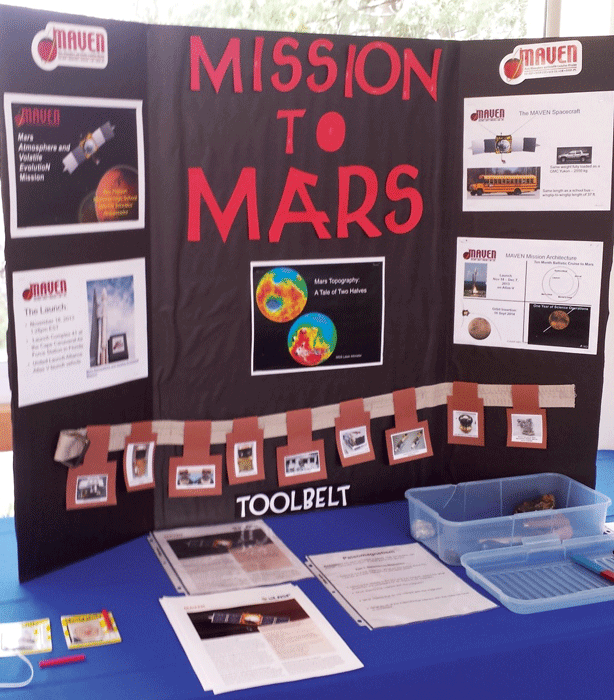Reaching for the Stars
Astronomy Day offers opportunities for all ages to learn about our universe
The Mars Atmosphere and Volatile Evolution mission, otherwise known as the Maven mission was talked about in detail at Astronomy Day in Phillips Science Hall Saturday afternoon. © 2014 Trent Tetzlaff, The Spectator
May 3, 2014
The UW-Eau Claire Physics and Astronomy department hosted Astronomy Day Saturday, an annual event that showcases activities and research done by community members, and the department’s staff and students.
The Chippewa Valley Astronomical Society sponsored the event, and runs the Hobbs Observatory at Beaver Creek Reserve outside of Fall Creek.
Astronomy Day, now a staple at Eau Claire since 2003 is a free event open to the public. Lauren Likkel, professor of physics and astronomy and director of the L. E. Phillips Planetarium, said the goal of Astronomy Day is for every age group to be able to learn something new.
“I hope that everyone will learn about the aspects of astronomy and become more interested in the topic,” Likkel said. “Along with this, I hope in return, visitors will spend more time looking at the night sky after this event.”
Astronomy Day is a nationally recognized event that used to be held at the Hobbs Observatory. It was not generating enough interest from the community because of the distance from campus Likkel said. So the Chippewa Valley Astronomical Society decided to move the event from Hobbs Observatory to campus starting in 2003.
“Phillips has a planetarium … so I suggested we start holding the event on campus which then allows us to have planetarium shows as part of it,” Likkel said.
As a result of the move, Likkel said the attendance has made a vast improvement. The location allows students and Eau Claire residents the opportunity to make it out.
Senior Mandy Neumann, a physics major and volunteer at the event, said Astronomy Day brings the community an opportunity to experience something vastly different from what they have seen before.
“This event gives everyone a chance to come out and see something they may not be exposed to everyday,” Neumann said. “But it also gives them the opportunity to explore, have fun and learn about the interesting topic of astronomy.”
Likkel said Astronomy Day offers a wide range of activities and presentations throughout the day that appeal to every age group.
These activities ranged from feeling the weight of objects on mars compared to earth, learning about the current mars maven mission, or even launching a two-liter bottle rocket into the sky with compressed air.
Jordan Simonis, a senior physics student and volunteer at the event said Astronomy Day is important because of the outreach to physics and astronomy.
“Astronomy Day is big because it helps with the physics and astronomy outreach on our campus,” Simonis said. “It helps get kids excited and interested in science so when they get older and begin to choose classes, they can look back and remember this event to aid them.”
Although the event was the main focus during the day, Likkel said another main point was to encourage the use of Hobbs Observatory for night tours of the sky during clear nights in the summer.
Likkel said people often forget about Hobbs Observatory because it is a little out of the way, but if people have an interest in the night sky it is something they should check out.
Simonis said an event like this really shows off how unique and different from the rest the field physics and astronomy really is.
“To me I have always felt that physics is the science of everything,” Simonis said. “Everything involves physics in some way so there is only a million and a half ways to learn about everything that goes on in our universe.”











